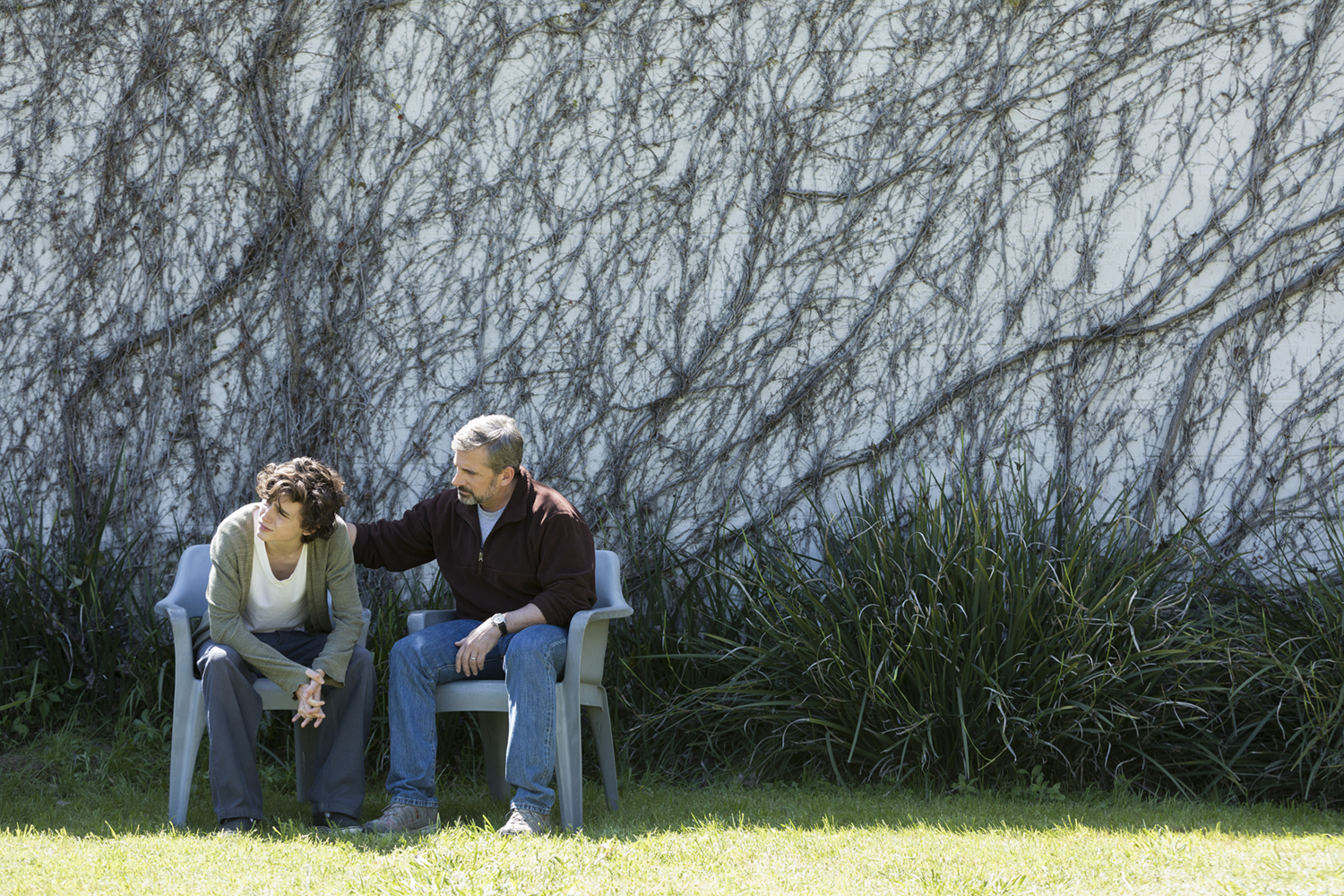Mid90s
Director & Screenplay: Jonah Hill Runtime: 84 minutes
Release Date: October 19, 2018
Mid90s stars 13-year-old Stevie (played by Sunny Suljic) who quickly becomes infatuated with the budding skateboarding culture in 1990s Los Angeles. In order to escape his troubled home-life and abusive older brother (Lucas Hedges), Stevie finds refuge among a group of older teenage skateboarders, played by real-life members of Illegal Civilization (Ryder McLaughlin, Olan Prenatt, Na-kel Smith, and Gio Galicia), a skate crew and creative collective based out of Los Angeles.
Jonah Hill, who made both his solo directorial and writing debut on this project, aimed to create an accurate portrait of teenage boyhood mirroring parts of his own experience as a teen in 1990s Southern California.
This movie tends to lean heavily on the crutch of nostalgia and reference: gangster rap and Wu-Tang Clan played relentlessly over shots of Los Angeles’s urban sprawl. At times, the film seemed to have some self-awareness of its overbearing authenticity, with its dialogue featuring unflinching use of dated language by today’s standards.
A particularly uncomfortable moment came around the halfway mark. At a party, an inebriated Stevie has a sexual encounter with a significantly older teenage girl, Estee (Alexa Demie). in a movie with a runtime of 84 minutes, this drawn-out scene feels unnecessary and gratuitous. Another awkward aspect of the film is that the only two female characters, Stevie’s mom (Katherine Waterston) and Estee, are portrayed primarily as objects to forward the film’s narrative of teenage boys finding a sense of masculinity and community. This film consciously depicts toxic masculinity among the group of young skaters, but never challenges or addresses it in a concrete sense.
Moments like Stevie’s encounter and the jarring and excessive sexist and homophobic language of the film bring into question what purpose this film and its narratives have in a cinematic landscape after #MeToo.
That being said, the film has redeeming qualities that make it a worthwhile viewing — particularly, the performances of the members of Illegal Civilization shone. They felt raw but not amateur, vulnerable but not naive. Furthemore, the score, composed by Oscar-winners Trent Reznor and Atticus Ross, was touching but not distracting, added to the overall tonal core of the picture. The cinematography, mimicking 16mm film, added to the film’s authentic 90’s vibe. Overall, the film is a promising debut for Jonah Hill, who displayed a solid understanding of how to effectively convey a touching and humorous 2018 story on the big screen.
Verdict:2 Lucas Hedges in “Slim Shady” Cosplay out of 5

Bohemian Rhapsody
Director: Bryan Singer Screenplay: Anthony McCarten Runtime: 133 minutes
Release Date: November 2, 2018
After eight tumultuous years and much anticipation, Bohemian Rhapsody, the epic biopic of the iconic band Queen, hit theaters on November 2, 2018. The film tracks Rami Malek as Freddie Mercury through his rise as an icon and as he copes with fame, relationships, and his sexuality. Mercury’s bandmates are played by Ben Hardy as Roger Taylor, Joseph Mazzello as John Deacon, and Gwilym Lee as Brian May.
Throughout its production, this movie was plagued by shifting directors, changing casts, and creative interference from both Hollywood executives and surviving members of the band. When news of the film’s production was first released, comedian Sacha Baron Cohen was announced to star as Freddie Mercury, but soon dropped the project due to creative differences with the production team.
Production issues aside, Bohemian Rhapsody does exactly what it promises to do: it delivers high-octane entertainment and music from one of history’s most iconic bands. Malek shines as an effervescent Mercury, expertly and gracefully navigating his rise from a Heathrow airport baggage attendant to one of the most celebrated vocalists of all time. The climax of the movie comes in the form of the band’s 1985 performance at Live Aid at Wembley Arena, which, quite frankly, is one of the most entertaining music sequences in recent memory. Malek struts across the Wembley stage with all of Freddie’s quintessential charm and charisma of and more, truly embodying the role of “Mr. Dynamite.”
One of the most glaring issues with this movie, however, is its treatment of Freddie’s sexuality and life as a gay man. Overall, the movie displays little empathy for the deep turmoil and persecution Mercury and millions of other queer people faced during this era. Mercury’s acceptance of his sexuality becomes intrinsically tied to his increasingly destructive partying — insinuating that Mercury’s sexuality and the success of the band are mutually exclusive.
In general, the movie shows Mercury in either his dramatic highs or lows, lending itself more to a superhero movie of his life than a portrait the complexity and genius of “the man behind the music.” Considering Mercury’s brilliance and notoriety, it is a shame that this movie failed to hit the right note.
Overall, Bohemian Rhapsody provides a great soundtrack and a stunning performance by Malek, but falls short in characterizing and empathizing with its protagonist. This in mind, this movie is genuinely entertaining for anyone from a diehard Queen fan to a casual listener.
Verdict: 3 AYYY-OOOHs! out of 5
 Beautiful Boy
Beautiful Boy
Director: Felix van Groeningen Screenplay: Luke Davies and Felix van Groeningen
Runtime: 120 minutes
Release Date: October 12, 2018
Belgian director Felix van Groeningen makes his English- language debut with Beautiful Boy, the adaptation of theDavid and Nic Sheff ’s New York Times bestselling memoirs, Beautiful Boy and Tweak: Growing up on
Methamphetamines. The movie follows David Sheff (Steve Carell) and his son, Nic (Timothee Chalamet), as Nic plunges into the depths of meth addiction.
The story, despite taking place almost 10 years ago, remains painfully topical in a nation increasingly gripped by addiction. The audience cannot help but feel nauseated as we see the precocious, sensitive Nic transform on the screen into a hardly recognizable addict, following him unflinchingly through ebbs and flows of recovery and eventual relapse. The film purposefully overwhelms the viewer with an unyielding sense of tragedy and loss up until the final shot. However, it very rarely feels heavy-handed or melodramatic — thanks in very large part to the understated cinematography and Carell’s grounded performance.
The setting of the Bay Area works well. The movie uses the area’s vivid scenery to its advantage. The Golden Gate Bridge comes to serve as an emblem of Nic’s addiction, as it is the pathway in and out of San Francisco; many scenes are shot in the Haight, where Nic goes to buy drugs. He joins a halfway house in the Tenderloin and eventually relapses in his friend’s ritzy Victorian house.
Chalamet and Carell’s performances succeed in encapsulating the complicated relationship between the self- destructive son and his unrelenting father. In particular, Chalamet’s Golden-Globe nominated performance expertly embodies the volatility of the deeply troubled Nic, effortlessly maintaining the sympathy of the audience even through his most unthinkable moments. The range of the emotion his character experiences and the rate at which it changes is, at times, dizzying. However, Chalamet keeps up with the pace of the film and delivers his lines with unwavering care. His vision of Nic, in large part, holds the piece together to create a much-needed sense of sincerity.
In some ways, this movie wants to be more than it ends up being. Despite the excellent source material and performance, the screenplay and editing lacks the wit and sharpness to make this movie memorable past the award show circuit. Furthermore, the music was distractingly varied and blatant in , making some scenes feel overly sentimental or claustrophobic. Nonetheless, as a whole, the film delivers its messages with the nuance seldom given to stories of addiction, allowing for the film to be more than a heavy- handed PSA. This movie is topical, heartbreaking, and exhausting, but a definite worthwhile watch.
performances from the cast including Liam Neeson, James Franco, Zoe Kazan, and Tim Blake Nelson, the film succeeds in creating a bizarrely wonderful and catastrophic depiction of the American Frontier.
Verdict: 4 Timothee Chalamet Crying Close-ups out of 5
 The Ballad of Buster Scruggs
The Ballad of Buster Scruggs
Directors: Ethan Coen and Joel Coen
Screenplay: Ethan Coen and Joel Coen
Runtime: 133 minutes
Release Date: November 16, 2018
The Ballad of Buster Scruggs, a series of six stunning vignettes from veteran filmmakers Joel and Ethan Coen, depicts the fictional lives of its both vibrant and bleak characters during the settling of the American Old West. From the retelling of comical cowboy journeys to the heart-wrenchingly tragic stories of Western settlers suffering unimaginable conditions, the Coen brothers once again prove their directorial greatness in this film.
One of the best vignettes, which shares the same name as the film’s title, follows the life of a murderous cowboy and alleged misanthrope, Buster Scruggs (Tim Blake Nelson). Scruggs parodies some of the best Western cliches: boisterous singing about life as a misguided cowboy and over the top Old West style shootouts.
The other five vignettes of the film, however, display entirely different and less humorous tones, such as The Gal Who Got Rattled, which explores the intensely isolated life of prairie traveler, Alice (Zoe Kazan), journeying to Oregon alone following the death of her brother. Overall, the contrasting styles of each vignette shows the incredible range of the Coen brothers’ directing and writing skills, while simultaneously leaving the audience in anticipation of what the next vignette will capture.
The Coen brothers assembled an all-star group of Oscar-nominated collaborators for this film. With the combination of Bruno Delbonnel’s breathtaking cinematography, Carter Burwell’s engulfing score, and stellar performances from the cast including Liam Neeson, James Franco, Zoe Kazan, and Tim Blake Nelson, the film succeeds in creating a bizarrely wonderful and catastrophic depiction of the American Frontier.
Verdict: 5 Coen Brothers out of 5







